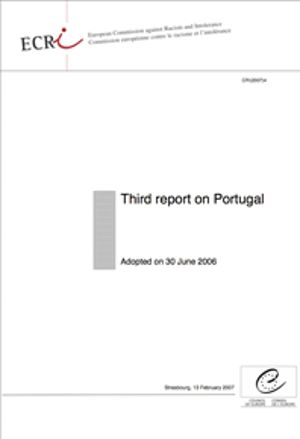ECRI - Third report on Portugal
Since the publication of ECRI’s second report on Portugal on 4 November 2002, progress has been made in a number of the fields highlighted in that report. The administrative law provisions and those included in the Labour Code prohibiting racial discrimination have been strengthened. A victim support unit for immigrants and others who have suffered racial or ethnic discrimination (UAVIDRE) has been created. The High Commission for Immigration and Ethnic Minorities (ACIME) has been restructured and strengthened, and its budget has been considerably increased. This institution actively works to facilitate the integration of immigrants and to combat racism and racial discrimination. The authorities have taken measures to legalise immigrant workers without legal status present on Portuguese territory. The Foreigners and Borders Service (SEF) has been improved. Immigrants and Gypsies have benefited from general measures aimed at social inclusion.
However, a number of recommendations made in ECRI’s second report have not been implemented, or have only been partially implemented. Gypsy communities still suffer from social exclusion and encounter difficulties in their dealings with the majority population, local authorities and law enforcement officials. Access to education, to public services, to housing and the opportunity to carry out an economic activity all remain problematic for these communities. A lack of awareness of the problem of racism has been noted on the part of the police, prosecutors and judges. The procedure for receiving complaints of racial discrimination contained in the Law 18/2004 suffers from major dysfunctions. There are allegations of direct and indirect racial discrimination in the fields of employment, housing, healthcareand access to goods and services, particularly affecting Black people and Gypsies. There are also allegations of discriminatory behaviour on the part of law enforcement officials. Regarding immigration, despite the efforts undertaken by the SEF to improve the situation, progress remains to be made both in managing the backlog and reception by the SEF and in implementing the procedure for granting a legal status to non-citizens living in Portugal. There are apparently still many immigrants without legal status in the country. These people are particularly vulnerable to exploitation by dishonest employers. Some immigrants still encounter integration difficulties. Racist stereotypes and racial prejudices persist within part of the population and are sometimes conveyed by the media, notably in the case of Gypsies, immigrants, Jews and visible minorities in Portugal.
In this report, ECRI recommends that the Portuguese authorities take further action in a number of areas. It recommends strengthening training on issues of racism and racial discrimination for actors in the justice system. It recommends improving the procedure for receiving complaints of racial discrimination under the Law 18/2004. ECRI recommends raising public awareness of the need to combat racism and intolerance and the benefits of a multicultural society. It asks the Portuguese authorities to continue their efforts aimed at taking measures in favour of the legalisation and integration of immigrants. It recommends additional measures to put an end to misconduct on the part of law enforcement officials towards minority groups. Finally, ECRI asks the Portuguese authorities to adopt a national strategy to combat the social exclusion of Gypsies, by improving their situation in such fields as housing, education and access to public services.
Source:
ECRI, 13.02.2007, http://www.coe.int/t/dghl/monitoring/ecri/Country-by-country/Portugal/Portugal_CBC_en.asp

